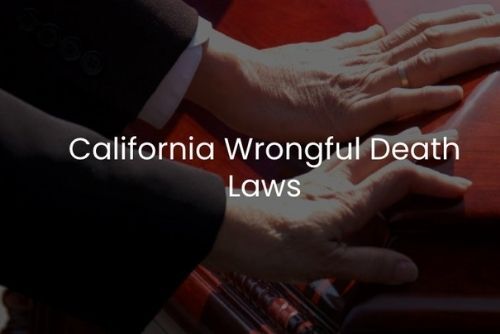California Wrongful Death Law

Losing a beloved family member is never easy. Knowing that someone else’s negligent or reckless actions caused the death makes it even harder to accept. However, California wrongful death law gives family members a chance to seek compensation for their loss. While no amount of money can make up for a person’s life, a fair settlement helps survivors manage medical and funeral costs and get the emotional support they need during such a painful time.
Did someone you love pass away due to another’s negligent or intentional act? Turn to a Sacramento wrongful death lawyer from Demas Law Group for help. Sympathy, compassion, and the fierce pursuit of justice are what you’ll get when working with our legal team. With over 25 years of experience serving Northern California clients, you can rely on us for the personal and professional guidance you need to rebuild your life. Call Demas Law Group or fill out an online form for a free consultation.
What is Wrongful Death?
In California, a wrongful death occurs when someone else’s actions cause another person’s death. The death could be brought about by:
- Negligence – Failing to use reasonable care to avoid harming another person
- Intentional acts – Willfully putting someone in a situation to hurt them
- Recklessness – Knowingly committing a dangerous act but not intending to hurt someone
Wrongful death actions are civil cases but can arise from criminal acts. The circumstances that allow family members to bring a wrongful death lawsuit may lead to a separate criminal case. The results of either case do not necessarily affect the other. In other words, you could win compensation in a wrongful death case even if the criminal case results in a dismissal.
How Long Do You Have to File a Wrongful Death Lawsuit in California?
California places a time limit on how long family members have to file a wrongful death claim. This deadline is called the statute of limitations.
Generally, qualifying family members have two years from the date of the victim’s death to file a claim. But some exceptions to the wrongful death statute of limitations exist:
- Discovery rule – Sometimes, families don’t learn the cause of the victim’s death right away. The discovery rule extends the statute of limitations to one year from the date the actual cause of death is discovered (or reasonably could have been discovered).
- Government entities – Acting quickly is critical if a government entity or employee caused your family member’s death. The limitations period is only six months from the date of death.
Who Gets the Money in a Wrongful Death Lawsuit in California?
The California Code of Civil Procedure 377.60 outlines the potential heirs in a wrongful death claim. They include:
- Surviving spouse or domestic partner
- Children
- Grandchildren (if the victim’s children have also passed away)
- Other minor children who were at least 50 percent dependent on the deceased for financial support, such as stepchildren
In cases where the decedent has no qualifying beneficiaries, wrongful death compensation is distributed according to California’s intestate succession laws. For example, a sibling can sue for wrongful death in California if there is no surviving person in the victim’s direct line of descent.
Types of Compensation in a California Wrongful Death Case
Families may pursue two main types of compensation in a wrongful death claim:
- Economic damages – Money for financial losses related to the death, such as medical bills, lost financial support, funeral and burial expenses, loss of gifts or fringe benefits the family would have received, and the reasonable dollar value of services the loved one would have provided.
- Non-economic damages – Compensation for intangible losses like loss of companionship, intimacy and sexual relations, society, and guidance.
Punitive damages, or money awarded to punish the wrongdoer for acts arising from malice, oppression, or fraud, are not possible in wrongful death lawsuits. However, punitives may be available in a related type of legal claim called a survival action.
What is a Survival Action?
The California Code of Civil Procedure 377.30 explains survival actions. In a survival suit, the deceased’s estate sues for losses the person incurred before their death. By contrast, a wrongful death claim addresses losses experienced by the family. Sometimes a survival action and wrongful death claim are filed together in one lawsuit. A knowledgeable attorney from Demas Law Group will help determine all legal options open to you.
Recent Changes to Wrongful Death Laws in California
California does not allow claimants to recover money for pain, suffering, and disfigurement in wrongful death suits. But thanks to a recent change to the statutes, survival actions now do.
Pain, suffering, and disfigurement damages are recoverable for cases filed between Jan. 1, 2022 and Jan. 1, 2026, or if the claimant was granted preference for an expedited proceeding before 2022. Parties can petition for an expedited proceeding if they are over 70 or under age 14 in wrongful death and personal injury claims.
The available pool of money paid into the deceased’s estate could increase significantly under this new law. However, it does have an expiration date (called a sunset provision), which means California could revoke the ability to recover these types of non-economic damages in the future. Talk to a wrongful death lawyer immediately to improve your chances of obtaining maximum compensation.
Contact Our Sacramento Wrongful Death Attorneys Today
You can improve your chances of winning a wrongful death suit by consulting with a proven personal injury attorney. While no lawyer can guarantee a successful outcome, your family can only benefit from getting professional legal advice before deciding your next steps.
Clients come to Demas Law Group because they’re struggling. We provide honest, down-to-earth feedback that explains what the law says and how we’ll fight for the justice and accountability you deserve.
Let us help you find closure. Call or contact us today for a free case review.
